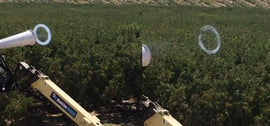Recently I attended a Preventive Controls for Human Food training course and am now a PCQI (Preventive Control Qualified Individual). I attended to get a vendor’s perspective and was the only vendor from a bird control company in the training. We truly want understanding what Food Processors, Growers and others who fall under FISMA regulations are facing.
We want to share with the Pest Control industry that the new FSMA rules are going to make it far more difficult for clients with bird problems to let them go unaddressed. Inspectors and plant managers for years have turned a blind eye to bird problems in many instances for a couple reasons. First, they are difficult to control; they are usually outside on the structure or loading dock area and last, they can cost a lot of money to properly control. It is my belief after attending this seminar that you as a PCO now have an obligation to point out that these birds may become an issue and, if you are properly trained, may be able to generate a profitable and effective bird management program for your client.
My background in pest management gave me a unique perspective since the majority of the training centered on food-borne pathogens. Birds and rodents were briefly covered but the threat to the food chain is not direct from these animals – it is indirect in so far as they may potentially contaminate the food chain through the introduction of pathogens. Salmonella, clostridium, and Listeria are of major concern.
Here is a brief explanation of what food plants now have to do: Teams are to be created at every plant to develop Food Safety Plans. A FSMA PCQI (Qualified Individual who has gone through this training) will lead the team. Part of each plan will be Hazard Evaluations – The PCQI (Preventive Control Qualified Individual) will lead the entire plant on all these new rules. As such, there may be a new person in the plant looking at preventive controls that may not have been part of the pest control decision team in the past. These people need to be contacted by the PCO to make sure they are coordinating with them and adding them to their contact list – there may be a risk to the PCO if they do not do this as the PCO should be part of the risk-assessment team (at least that is what I would do if I were managing the account).
In HACCP, the critical control point was typically somewhere in this process. FSMA wants them to look for hazards outside the process line. This can be supply chain, receiving, plant, shipping – anywhere a hazard could contaminate. Hazard Definition – Any Biological, Chemical –including radiological- or physical agent that has the potential to cause illness of injury (21 CFR 117.3).
To emphasize what is happening here, I was contacted by a pistachio processing facility in CA a few weeks ago. This plant has storage tanks, conveyors and dryers outside and has sparrows just hanging around. The inspector at their most recent audit told them this was no longer acceptable and they need to get rid of these birds – and these are OUTSIDE! Thank goodness for our Tank Mix and newest technology, sonic nets.
There are a couple major issues here. First of all, plants now have to proactively determine potential risks, identify them as something a preventive measure may address and then provide a solution. If you, as a PCO, are not engaged in this process, you are not doing your client any favors. Of course, not all birds, or even rodents, at a plant are going to be classified as issues that need to be preventive dealt with but you do not want to be the one who missed it if they get in trouble.
If you are selling or servicing into a food environment, learn what you can about the micro risks these people face and help them identify how your solutions for macro pests might ensure they reduce the risk of these microbiological hazards.
By Steve Rehberg, PCQI



